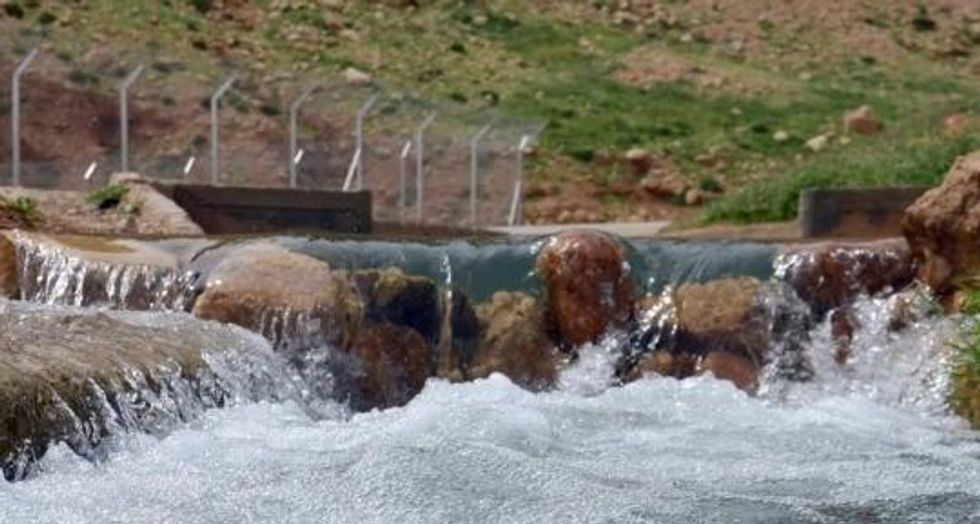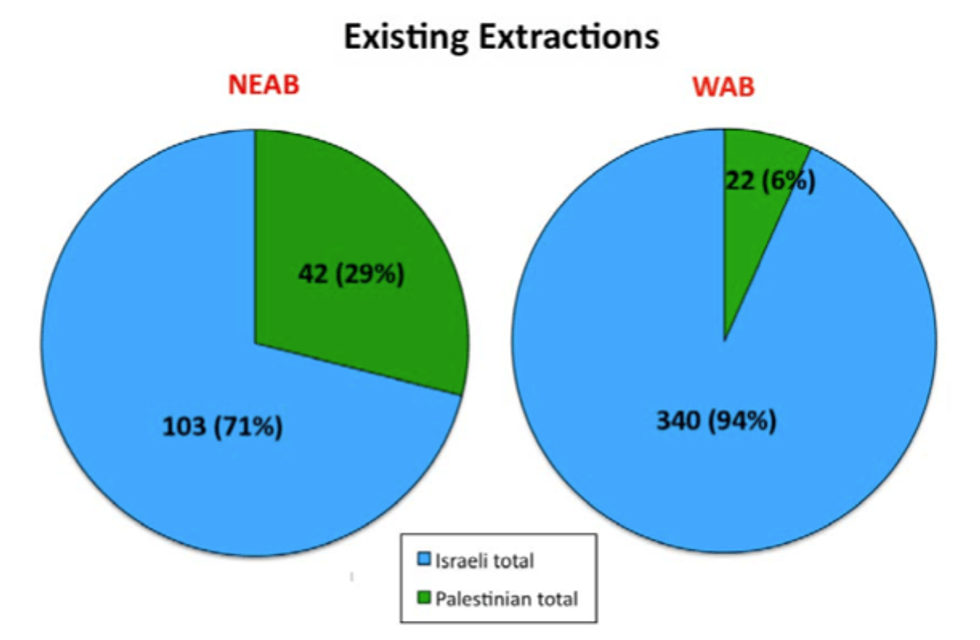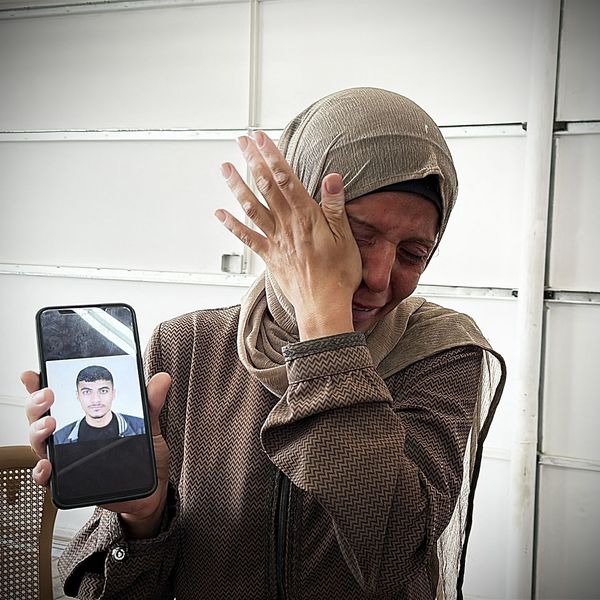Report Uncovers 'Water-Apartheid' in the Occupied West Bank
Study of Israel's discriminatory practices links water grab to settlement expansions in occupied Palestinian territory

Published Monday by the Ramallah-based human rights organization Al-Haq, "Water for One People Only: Discriminatory Access and 'Water-Apartheid' in the Occupied Palestinian Territory," (pdf) reports that Israel has claimed up to 89% of an underground aquifer that is largely located in the West Bank, giving Palestinians only access to the remaining 11%.
The water grab has fueled increased discrepancy in water usage in the region with the 500,000 Jewish settlers consuming approximately six times the amount of water used by the 2.6 million Palestinians living in the West Bank--with the discrepancy growing even greater when agricultural water use is accounted for.
"There is a grave injustice in the division of water, and the results have been catastrophic," Tawfiq Salah, mayor of West Bank village al-Khader, told Al-Monitor.
The report cites a number of efforts--including the continued establishment of Jewish settlements in Palestinian territory, the transfer of control of Palestinian water infrastructure to Israel's national water company, 'Mekorot,' and finally the Oslo Accords--all which have effectively diminished Palestinian water rights and granted Israel sweeping authority over the vital resource.
Writing about the report, Al-Monitor's Jihan Abdalla quotes Musa, a Palestinian father of six, who had attempted to build a rainwater cistern in his field before the Israeli authorities quickly issued it with a demolition order. Abdalla continues:
Musa says if they had access to sufficient, affordable water, his family would be able to live off their ancestral field, selling their grapes, olives and fruit in nearby markets.
That, he says, is the reason why Israeli authorities prevent them from building a cistern, and why they do not have any running water.
"They don't want us to plant or grow anything, they just want us to have barely enough water for drinking and that's it," Musa says looking at the unfinished, empty hole in the ground.
Roughly 313,000 Palestinians in the occupied West Bank are not connected to a water network, according to Al-Haq, and the United Nations Office for the Coordination of Humanitarian Affairs estimates that between 2009 and 2011 over 200 Palestinian wells and water reserves in the West Bank were demolished by Israeli officials.
Al-Haq writes that that Israel's discriminatory water policy in the West Bank is "intrinsically linked to its settlement expansion strategy."
The report continues:
Israel's water policies represent only one element of an irreversible structural process that can only be described as colonial. Israel's intention to permanently change the status of the occupied territory, de facto exercising sovereignty, reveals itself through the establishment and expansion of settlements in the West Bank (currently over 200) and by the creation of a network of roads and flourishing agricultural enterprises for their benefit. The presence of settlements aims to permanently deny the Palestinian population the exercise of their right to self-determination by fragmenting the OPT and preventing the Palestinian people from exercising sovereignty over natural resources, in particular land and water.

_____________________
An Urgent Message From Our Co-Founder
Dear Common Dreams reader, The U.S. is on a fast track to authoritarianism like nothing I've ever seen. Meanwhile, corporate news outlets are utterly capitulating to Trump, twisting their coverage to avoid drawing his ire while lining up to stuff cash in his pockets. That's why I believe that Common Dreams is doing the best and most consequential reporting that we've ever done. Our small but mighty team is a progressive reporting powerhouse, covering the news every day that the corporate media never will. Our mission has always been simple: To inform. To inspire. And to ignite change for the common good. Now here's the key piece that I want all our readers to understand: None of this would be possible without your financial support. That's not just some fundraising cliche. It's the absolute and literal truth. We don't accept corporate advertising and never will. We don't have a paywall because we don't think people should be blocked from critical news based on their ability to pay. Everything we do is funded by the donations of readers like you. Will you donate now to help power the nonprofit, independent reporting of Common Dreams? Thank you for being a vital member of our community. Together, we can keep independent journalism alive when it’s needed most. - Craig Brown, Co-founder |

Published Monday by the Ramallah-based human rights organization Al-Haq, "Water for One People Only: Discriminatory Access and 'Water-Apartheid' in the Occupied Palestinian Territory," (pdf) reports that Israel has claimed up to 89% of an underground aquifer that is largely located in the West Bank, giving Palestinians only access to the remaining 11%.
The water grab has fueled increased discrepancy in water usage in the region with the 500,000 Jewish settlers consuming approximately six times the amount of water used by the 2.6 million Palestinians living in the West Bank--with the discrepancy growing even greater when agricultural water use is accounted for.
"There is a grave injustice in the division of water, and the results have been catastrophic," Tawfiq Salah, mayor of West Bank village al-Khader, told Al-Monitor.
The report cites a number of efforts--including the continued establishment of Jewish settlements in Palestinian territory, the transfer of control of Palestinian water infrastructure to Israel's national water company, 'Mekorot,' and finally the Oslo Accords--all which have effectively diminished Palestinian water rights and granted Israel sweeping authority over the vital resource.
Writing about the report, Al-Monitor's Jihan Abdalla quotes Musa, a Palestinian father of six, who had attempted to build a rainwater cistern in his field before the Israeli authorities quickly issued it with a demolition order. Abdalla continues:
Musa says if they had access to sufficient, affordable water, his family would be able to live off their ancestral field, selling their grapes, olives and fruit in nearby markets.
That, he says, is the reason why Israeli authorities prevent them from building a cistern, and why they do not have any running water.
"They don't want us to plant or grow anything, they just want us to have barely enough water for drinking and that's it," Musa says looking at the unfinished, empty hole in the ground.
Roughly 313,000 Palestinians in the occupied West Bank are not connected to a water network, according to Al-Haq, and the United Nations Office for the Coordination of Humanitarian Affairs estimates that between 2009 and 2011 over 200 Palestinian wells and water reserves in the West Bank were demolished by Israeli officials.
Al-Haq writes that that Israel's discriminatory water policy in the West Bank is "intrinsically linked to its settlement expansion strategy."
The report continues:
Israel's water policies represent only one element of an irreversible structural process that can only be described as colonial. Israel's intention to permanently change the status of the occupied territory, de facto exercising sovereignty, reveals itself through the establishment and expansion of settlements in the West Bank (currently over 200) and by the creation of a network of roads and flourishing agricultural enterprises for their benefit. The presence of settlements aims to permanently deny the Palestinian population the exercise of their right to self-determination by fragmenting the OPT and preventing the Palestinian people from exercising sovereignty over natural resources, in particular land and water.

_____________________

Published Monday by the Ramallah-based human rights organization Al-Haq, "Water for One People Only: Discriminatory Access and 'Water-Apartheid' in the Occupied Palestinian Territory," (pdf) reports that Israel has claimed up to 89% of an underground aquifer that is largely located in the West Bank, giving Palestinians only access to the remaining 11%.
The water grab has fueled increased discrepancy in water usage in the region with the 500,000 Jewish settlers consuming approximately six times the amount of water used by the 2.6 million Palestinians living in the West Bank--with the discrepancy growing even greater when agricultural water use is accounted for.
"There is a grave injustice in the division of water, and the results have been catastrophic," Tawfiq Salah, mayor of West Bank village al-Khader, told Al-Monitor.
The report cites a number of efforts--including the continued establishment of Jewish settlements in Palestinian territory, the transfer of control of Palestinian water infrastructure to Israel's national water company, 'Mekorot,' and finally the Oslo Accords--all which have effectively diminished Palestinian water rights and granted Israel sweeping authority over the vital resource.
Writing about the report, Al-Monitor's Jihan Abdalla quotes Musa, a Palestinian father of six, who had attempted to build a rainwater cistern in his field before the Israeli authorities quickly issued it with a demolition order. Abdalla continues:
Musa says if they had access to sufficient, affordable water, his family would be able to live off their ancestral field, selling their grapes, olives and fruit in nearby markets.
That, he says, is the reason why Israeli authorities prevent them from building a cistern, and why they do not have any running water.
"They don't want us to plant or grow anything, they just want us to have barely enough water for drinking and that's it," Musa says looking at the unfinished, empty hole in the ground.
Roughly 313,000 Palestinians in the occupied West Bank are not connected to a water network, according to Al-Haq, and the United Nations Office for the Coordination of Humanitarian Affairs estimates that between 2009 and 2011 over 200 Palestinian wells and water reserves in the West Bank were demolished by Israeli officials.
Al-Haq writes that that Israel's discriminatory water policy in the West Bank is "intrinsically linked to its settlement expansion strategy."
The report continues:
Israel's water policies represent only one element of an irreversible structural process that can only be described as colonial. Israel's intention to permanently change the status of the occupied territory, de facto exercising sovereignty, reveals itself through the establishment and expansion of settlements in the West Bank (currently over 200) and by the creation of a network of roads and flourishing agricultural enterprises for their benefit. The presence of settlements aims to permanently deny the Palestinian population the exercise of their right to self-determination by fragmenting the OPT and preventing the Palestinian people from exercising sovereignty over natural resources, in particular land and water.

_____________________

